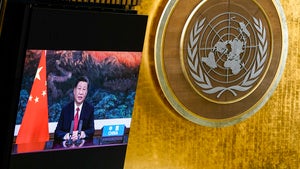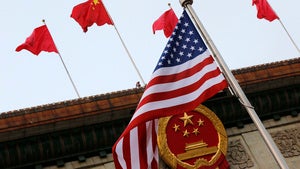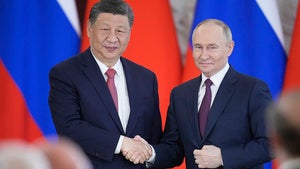Everyday Chinese citizens view international trade as good for the economy and job creation, and say China should pursue a policy of global free trade.
New research conducted by the Chicago Council on Global Affairs and The Carter Center offers a rare window into the attitudes of everyday Chinese citizens on international affairs. Fielded April 25 to June 16, 2025, the survey results show that despite the challenges of US-China economic competition, a real estate slump, and slowed consumer spending, the Chinese public is generally upbeat about China’s current economic conditions and believes the economy will continue to improve. This extends to their own personal economic situation. Additionally, the Chinese public broadly embraces international free trade as good for their standard of living, job creation, and the Chinese economy, despite US President Donald Trump’s “Liberation Day” tariffs and Chinese countermeasures which were in effect at the start of this survey. Though demographic factors like age and education affect perceptions somewhat, the data paint an overall picture of a Chinese public with economic confidence and strong support for global trade.
There are numerous challenges in conducting surveys in China, including designing a representative sample, a closed media environment, and the potential for self-censorship. While treating these results with a degree of skepticism is healthy, previous and repeated surveys conducted by other organizations have found similar patterns among Chinese public opinion on international issues.
Key Findings
- A large majority (84%) believe China’s economy is doing well overall, and more than half feel comfortable with their own personal financial conditions, with a majority saying they have disposable income after taking care of necessities (56%).
- For the minority who think economic conditions are currently bad (16%), the top concerns are youth unemployment (33%) and capital flight (24%).
- Sizable majorities believe trade is good for China’s overall economy (73%), domestic job creation (76%), consumers like themselves (70%), and their own standard of living (73%).
- Most prefer a policy of global free trade (60%), with the remainder split between advocating for a trade bloc of friends and partner countries (21%) or less commerce and more self-reliance (18%).
- Educational attainment is a key factor in Chinese citizens’ personal economic situations, their opinions about the future of China’s economy, and their views of international trade.
Broad Optimism about China’s Economic Present and Future
Despite economic challenges, Chinese citizens express broad optimism about the national economy. A large majority (84%) assess China’s current economic conditions as either very good (21%) or somewhat good (63%). As the figure below demonstrates, positive economic assessments extend across age and educational cohorts.
Additionally, respondents are upbeat when evaluating changes in China’s economy over the past year. A majority (61%) feel the economy has gotten better over the last 12 months, with close to half (46%) saying conditions have improved somewhat and 16 percent reporting a lot of improvement. Almost a quarter (23%) see no significant change, while relatively few think things have worsened somewhat (13%) or a lot (2%). Projections for the next year follow a similar pattern. Around one in five (23%) predict China’s economic conditions will stay roughly the same. But roughly half (48%) expect the economy to get somewhat better, and a fifth (21%) expect a lot of improvement.
Most, Especially the Higher Educated, Believe Household Finances Are Decent and Getting Better
In addition to favorable ratings for the health of the national economy, most Chinese seem to feel pretty comfortable with their living standards. Almost six in 10 (56%) feel they can at least keep themselves afloat and treat themselves on occasion. This includes a plurality (47%) who say they can afford a few extras after taking care of the basics, while another nine percent say they can afford expensive things. On the other end of the spectrum, 11 percent report struggling to buy necessities, while a third (33%) say they can afford necessities but not much more.
A demographic breakdown shows just how much education matters for perceived financial well-being. Just 36 percent of Chinese without a high school diploma can afford more than necessities, and fully a quarter (26%) are struggling to get by. Meanwhile, a majority of Chinese with a college degree or more (63%) are able to afford more than just necessities, with one in 10 saying they can afford expensive things (11%).
Higher education has only recently become widely available in China. As of 2024, 60.8 percent of China’s college-aged population are enrolled in a university, including vocational and technical tertiary education. But that number was just 5 percent in the early 1990s and did not reach 50 percent until 2019. As a result, only 15.5 percent of China’s total population completed college as of the most recent census in 2020.
When invited to speculate about what the next year will bring for their personal finances, most anticipate stability or improvement in living standards. While half believe they will be roughly in the same boat as today (49%), four in 10 Chinese believe they will be better off in a year (43%). Just 8 percent believe they will be worse off financially after 12 months.
As with other economic indicators, optimism for economic growth also varies by educational attainment. Those with more formal schooling are more likely to say they will be better off in the future. Just 27 percent who have not completed high school are optimistic their economic situation will improve in the next year, compared to four in 10 or more of those with at least a high school degree (see figure, above).
At the same time, however, those Chinese with a college degree are slightly less optimistic than those who have a non-BA post-high-school educational credential (41% vs. 48%). This may reflect the boom in undergraduate and postgraduate education and a lack of commensurate job growth. Over the past two decades, Chinese universities have rapidly expanded postgraduate enrolment. Some 1.3 million students received grad-school acceptances in the 2023 academic year, double the figure for 2011 (560,000). Amid an explosion of masters degrees and PhDs, those Chinese with a college education may be keenly aware they are facing educational credential competition in the job market.
Perceived Threats Loom over Economic Outlook; Private Investment Least Significant
When asked what factors are contributing most to China’s current economic conditions, Chinese split most sharply by their initial perceptions of their country’s economy. Economic optimists (those who view China’s economy as very or somewhat good) are much more likely than pessimists (those who view China’s economy as very or somewhat bad) to focus on America’s role in China’s economy, suggesting they see external factors playing a critical role. A plurality of those who believe China’s economy is either somewhat or very good (23%) point to US restrictions as the top factor in China’s economic outlook. Just a tenth (10%) of pessimists agree. By contrast, economic pessimists are twice as likely as optimists to point to more-domestic factors. A third (33%) name youth unemployment as the greatest factor contributing to China’s economic outlook (vs. 16% among optimists). In recent years, youth unemployment has risen so quickly that China’s statistical bureau suspended data reporting in 2023 before revising the metric to exclude students. But even the massaged figure remains depressingly high. As entry-level corporate jobs evaporate and cuts loom over the most-vaunted sectors, first-time jobseekers brace for extreme competition while millennials make memes about mid-career layoffs. And perhaps unsurprisingly, youth unemployment is seen as the greatest factor in China’s economic outlook for Chinese under age 45 (22%) and for those Chinese with at least a college degree (25%).
Another critical issue: capital flight, which a quarter of pessimists (24%) point to as the top factor shaping China’s economic outlook (vs. 15% of optimists). Capital leaving the country has cast a pall over China’s economy as flagging demand and geopolitics drive foreign businesses to reconsider their investments in the country. To maintain stability, Beijing has ramped up enforcement of capital controls and vigorously defended the yuan. But while these measures may help, Chinese economists nevertheless expect capital flight to persist.
Majorities View Trade Favorably, Support Global Free Trade
Chinese citizens take kindly to international trade. When asked about its overall impact on the economy, three quarters (73%) offer a positive evaluation. In terms of the labor market, 76 percent say trade helps create jobs in China. Most (70%) feel they benefit from China’s commercial ties with the outside world as consumers, and 73 percent of Chinese believe foreign trade is good for their own standards of living. As is true for other economic issues, better-educated Chinese are more likely to view international trade as good.
On a broader level, a majority of Chinese (60%) also advocate for a policy of global free trade. In contrast, one in five (21%) support the creation of exclusive trading blocs that shut out certain countries. And just 18 percent wish to pull back from world markets and seek greater self-sufficiency. While at least half of all educational cohorts favor pursuing global free trade, those Chinese with at least a bachelor’s degree are the most likely to back a free trade policy (67%).
Conclusion
Chinese public opinion paints a picture of cautious optimism: People generally feel secure in their financial footing and hopeful about the future, even amid structural challenges. Confidence in the national economy is widespread, and support for open, global trade remains strong. Yet this optimism is tempered by demographic divides, with less-educated citizens particularly more likely to feel vulnerable to job market instability and less connected to the benefits of globalization.
The data also highlight general trends for young adults in China, who have high expectations but also confront historic levels of youth unemployment. The highest educated, who tend to be younger on average, face a similar tension: Their ability to realize their ambitions requires the job market to absorb their skills, a tall order owing to the structural mismatch between labor supply and demand.
This analysis is based on data from a poll conducted by NORC from April 25 through June 16, 2025, using a random digit dialing (RDD) CATI telephone methodology among mainland China’s adult population. The final poll includes 1,002 completed surveys with adults aged 18 and over, excluding 52 test cases. The design effect is 1.77 with an overall margin of sampling error of ±4.12 percentage points at the 95 percent confidence level.
The RDD sample frame was created using the national numbering plan provided by the Ministry of Industry and Information Technology (MIIT). The sample included only mobile phone numbers used for residential services and excluded those for commercial services. The sample frame excluded Hong Kong, Macau, and Taiwan.
The sampling frame of active mobile phone numbers was drawn from the four government-owned mobile service networks, which have a total over 1.75 billion subscriptions. The numbers were pre-screened to include working non-business numbers. The sample frame included 91,806 numbers stratified by the proportion of each network. The following mobile service networks were used:
- CBN: 1.83%
- China Mobile: 56.59%
- China Telecom: 22.86%
- China Unicom: 18.72%
There was no within-household sampling and so any adult age 18 or over who picked up the call was eligible to take the survey. There was a maximum of eight attempts to reach an adult for each number.
The field work was conducted by a NORC-trained, phone data collection firm using live interviewers. Interviewers were at least 20 years of age, mostly women. Interviews were conducted in Mandarin, however the field staff included interviewers with sufficient fluency in major Chinese dialects (such as Cantonese or Shanghainese) to conduct interviews with respondents who use a dialect other than Mandarin. Only interviewers who were born in mainland China were hired for the project, to avoid the potential impact of language/dialect on respondent cooperation.











Related Content
 Public Opinion
Public Opinion
Whether Beijing should take any leadership position on the world stage, however, is an overwhelming “yes.”
 Public Opinion
Public Opinion
Few see the United States as a friend to China, but a majority want Beijing to use a mix of cooperation and containment in its approach to Washington.
 Public Opinion
Public Opinion
Other neighboring countries, including Japan, India, the Philippines, and Vietnam, are viewed less favorably.
 Public Opinion
Public Opinion
New polling from the Chicago Council on Global Affairs and The Carter Center offers a rare window into how Chinese citizens view China's global role and foreign policy.


